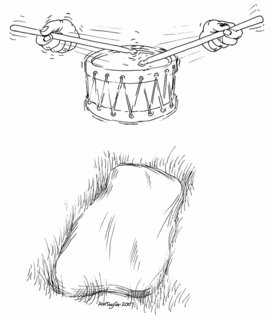The Golden Leg (5 page)
Authors: Dale Jarvis


Y
ou will not find the community of
Turk's Gut on any modern map, so you will just have to believe me when I tell
you that it exists. If you do manage to find it, drive down the old road toward
the water and pull over when you get to the very last house. It is the only
house there, a bright red one, so I am sure you will not miss it.
Beside the house there are a few trees, and under their branches, hidden among
the tall grass, there is a long, flat stone. Stop there, and listen. For that
flat stone marks the grave of the Drummer of Turk's Gut. And though he has been
dead and buried for longer than anyone alive can remember, there are those who
say his drumming has never ceased.
Exactly where the Drummer came from is something of a mystery. Some believe
that the Drummer was a prisoner of war, while others hold that he arrived as a
stowaway on a sailing ship. All that is known for certain is that one day in the
early part of the 1800s, the Drummer simply appeared. He was dripping wet, as if
the ocean had tried to swallow him down, found him inedible, and had spat him
out onto dry land.
None of the good people of Turk's Gut knew where the man had
come from, nor did they know his true name. The man himself could offer little
assistance, for he seemed to know just as little about his own identity as they
did. It was clear that the man was suffering from some sort of amnesia. There
was no doctor to provide assistance, and it was thought by the local people that
he had suffered some sort of memory loss, perhaps due to a war injury.
While the stranger could not remember his name, or where he was born, or how he
had arrived in Turk's Gut, he did retain one impressive skill. He remembered how
to play the drum. When one was placed in his hands, he played it with a skill
that astonished all who heard him. Because he seemed to have no name of his own,
the stranger was nicknamed “The Drummer” by the local residents.
The Drummer was taken in and shown great courtesy by a local family, the
Simmses. Over time, the Drummer was accepted as one of the community, and the
sound of his drum became a part of the rhythm of local life. After living in
Turk's Gut for many years, the Drummer passed away. The Simms family buried the
man on their property, and laid a long, flat stone over his grave to mark his
final resting spot.
Eternal rest, however, seemed to elude the Drummer. After his death, ghostly
hands could be heard beating on an invisible drum. Before long, stories began to
spread along the coast that when people in the Drummer's adopted home passed
away, the Drummer could be heard for miles around.
The noise of the Drummer was heard only during the
night, when
all was quiet. It was as if he wanted no competition, so that there could be no
mistaking his playing for what it was. It was also rumoured that on the eve of a
local person's death, the Drummer could be heard playing the drums under the
windowsill of the person who was fated to die.
So if you can find it, do pause for a moment beside that long, flat stone and
listen, preferably in the evening, when all is quiet. Listen very carefully. If
you hear the sound of a rhythm being tapped out on an invisible drum, it could
be the Drummer, playing the music he loved so much in life. Or it could be a
warning, a sign that someone you love, or even yourself, will be the next soul
to join the Drummer beyond Death's shadowy veil.


O
nly a short number of years ago, there
was a family who lived in a small wooden house on a fairly quiet street. The
family had a young son. On those days when the weather forced him to play
inside, the small boy was more than content to wile away the hours playing down
in the basement of the old house.
The boy played by himself, but at the same time he never seemed to be alone.
His mother could hear him talking as he amused himself, as if he were chatting
with someone else. One day, she asked her son to whom he was speaking.
“My dog,” said the boy.
“Does your dog have a name?” asked his mother, smiling to herself.
“No,” said the boy, seeming quite content that his invisible pet should remain
nameless.
“Does he go with you to school?” she asked, playing along.
“No,” said the boy again. “He can’t leave the basement.”
The mother thought that having an imaginary pet was
relatively
harmless. In fact, she was more concerned about the state of the basement itself
than she was about her son’s active imagination. The walls had never been
finished properly. The concrete floor was uneven and cracked, and looked as if
it had been poured in great haste.
She found a workman who was willing to redo her basement, and on the first day
he was available the woman showed him exactly what she wanted done.
“My son plays down here all the time,” she told the workman. “He has an
invisible dog which he claims can’t leave the basement.”
The workman only nodded, more concerned with the practical issues of how he was
going to start work than he was about an imaginary beast. The mother went
upstairs, and the man set to work with a sledgehammer, breaking up the concrete
floor.
The house rang with the sound of the man breaking up the old floor, and dust
started to seep under the crack of the basement door. Then, suddenly, the sound
of the blows ceased.
For a while, there was silence, then the sound of footsteps slowly climbing the
cellar stairs. The workman emerged from the depths, and called out to the
owner.
“Miss,” said he, “I think you better take a look at this.”
“What is it?” she asked.
“I think you better just look,” he replied.
Together they went back down the rickety stairs to the basement, through a
cloud of dust. The man brought her to
where he had started to
break up the old concrete floor, revealing the dirt beneath the house. The man
picked up a heavy iron pry rod and slipped one end of it under a large chunk of
concrete. He heaved up the concrete, flipped it over with a great thud, and then
stepped back out of the way. The mother gave a great gasp and felt the blood
drain from her face.
There, uncovered from where it had lain hidden for countless years, lay the
skeleton of what could only be a large dog.
In shock, the woman stared down at the skeleton of the hound, speechless.
“Get rid of it,” she said, finally. “I don’t care what you do with it, just
get it out of my house.”
The man nodded as the woman fled the basement. He removed the old bones along
with the rest of the broken-up concrete. Work progressed without further
incident. A new floor was laid, the walls plastered and painted, and before too
long the basement was finished. The workman was paid and went on to his next job
in another part of the city. The wife never mentioned the bones to her husband,
or to her young son.
From that point on, on those days when the weather forced him to play inside,
the small boy was more than content to wile away the hours playing down in the
new basement of the old house. But he played alone, quietly, and his imaginary
dog was never mentioned again.

Y
ears ago, there were few paved roads
joining small towns. People would go from town to town by boat, or would walk
along the paths that had grown up, linking communities. One day, a man was
walking along one of these paths, heading toward home. It was a fine day, but
the man walked alone, with no one to keep him company.
At one point along the path, he stopped and looked back. There, off in the
distance behind him, he could see another figure, that of a man, following the
same path, and heading toward him. The stranger was a fair distance away, so the
first man turned his face back toward the trail, and started walking
again.
Eventually, he came to a spot along the path where a stream cut across it and
trickled down into a small pool in the rocks. He looked back in the direction
from which he had just come, and there, off in the far distance, he could see
the stranger still walking along.
At this point, the traveller thought that he would stop there for a rest, have
a drink of water, and wait for the
stranger to catch up. He
figured that having a companion to talk to along the path would shorten the
journey. He went to the small pool of water, and knelt down to get a
drink.
The man reached out, planning to cup his hands in the water and scoop up enough
for a sip. Looking down into the still pool he saw the reflection of his own
face. He also saw the reflection of something that gave him quite a start, for
reflected in the water, just above his own face, was the face of another
man.
Shocked, the kneeling man looked up to see a figure standing immediately behind
him. Twisting his head up and looking at the stranger, the man realized that it
was the same person who, only moments before, had been far off in the distance
along the path.
The mysteriously-arrived stranger stood above him, smiling down at the
traveller. Then as the man watched, the stranger’s smile grew wider and wider,
spreading an unearthly distance, all the way from ear to ear. Then, much to the
man’s horror, the lower half of the stranger’s jaw dropped down, to reveal row
upon row of tiny, sharp, pointed teeth.
The man was so shocked by this that he fell over backward, floundering in the
water and struggling to get away from the creature. By the time he got himself
straightened up and poised to run, he realized that the stranger had vanished
completely.

